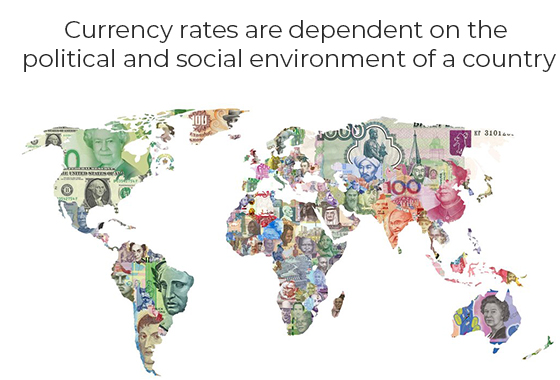Liquidity and Speculation
Forex is the most liquid market around. With a daily turnover of over $5 Trillion, it has the highest cash flow. How does this affect anything though?
 Well, more cash flow means there is more opportunity. When cash moves it means transactions are happening. More transactions mean more chances for participation and more opportunity for earning.
Well, more cash flow means there is more opportunity. When cash moves it means transactions are happening. More transactions mean more chances for participation and more opportunity for earning.
Another aspect and benefit of liquidity is that it generally controls volatility of rates. When the market volume is high, a small change somewhere will not drastically affect rates all over. The market has the potential to absorb most shocks or disruptions. Or that is how it’s supposed to be.
With Forex though, this is not always the case. While being the most liquid market in the world, it is also the most prone to fluctuations as it is influenced by a number of factors.
Currency rates are not just dependent on the liquidity of fx. They are controlled by the political and social environment of a country, as well as the interest rates, and any other economic factor.

This volatility can mean there is a greater potential for loss and that the fx market is an overall risky place to invest in. Sure. But on the other hand, it can also mean that there is more room to earn. If you plan and your speculations prove to be correct then you’re in for a treat. Anytime you’re going in, you have to do it with these two possibilities in your mind and be aware that they are both very probable.

What is speculation and what are the ways to do it more systematically?
Speculation is basically what the name suggests. It’s guesswork. Those who have been in the field long enough figure out where to look and how to tell if a currency is going up or down. They then base their trades on that guess. If they think a currency is likely to move up, they will buy it and then sell at a profitable price. If they think it is likely to go down, they will sell it at a good rate, and then buy it back at a cheaper one thus making profit. Speculators contribute to the volatility but because of them the market stays liquid too. If speculators or day traders didn’t do what they do, there would be very little cash flow and very little opportunity to make profits.
There are different ways to do this speculation. You can do it through:
- Spot
- Forwards
- Futures
- Options
- ETFs
Spot Market
This is the easiest and the most frequently used method. Traders trade on the spot. This means whatever the market price is, you buy or sell at that rate.

Forward Transactions
This is a transaction that does not happen at the spot. It is set for some day in the future. The ‘forward points’ or price are decided by seeing the interest differential between the two currencies being traded.
Futures
This is a contract between two parties to carry out a deal at a set date with a set amount of currency. The hope is to make profit on the exchange. Most of these contracts are sold before their expiration date by the original holders. This is because if they carry it to the expiration date, they will have to deliver the currency promised. By selling it before expiration, they can make a profit simply on the buying vs selling price.
Options
This contract allows the trader the option (as is evident from the name) to buy or sell a currency at a set rate on the expiration date. Unlike Futures, there is no obligation to do it though. This market does not operate on a 24 hour schedule though.

ETFs or Exchange Traded Funds
These are managed by financial institutions and so are properly regulated. These institutions place either one currency or a set up as a basket on any proper exchange. Here they are offered to the public to be bought, just like they would a stock. This is not part of the open forex market though so the first thing is that these transactions aren’t open 24 hours. Secondly, as these are institutionalized funds, transaction costs and other apply.
Next, let’s look at all the measures involved in forex trade






